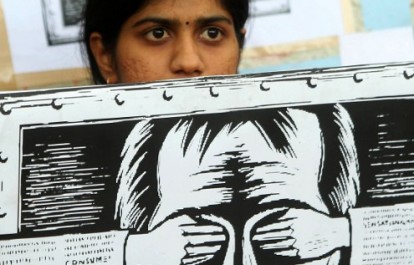Press Statement
Indian Supreme Court guarantees free speech online
27 Mar, 2015
The International Federation of Journalists (IFJ) joins its affiliates the Indian Journalists Union (IJU) and the All Indian Newspaper Employees Federation (AINEF) in welcoming the Supreme Court’s judgment on March 24, 2015 to strike out Section 66A of the Information Technology (IT) Act as it contradicted with the rights of freedom of expression.
Section 66A, which had been in effect since 2009, criminalized freedom of expression. It included a vaguely worded provision that could see anyone convicted of sending messages deemed ‘grossly offensive’ or ‘menacing’ over the internet or other communication devices, sentenced to three years in jail. The amendment to the IT Act was described as draconian by the IJU and other rights organizations as the definitions of offences was ‘open-ended & undefined’ and since its adoption, Section 66A has been ‘misused by several state governments to stifle expression of dissent against the ruling establishments’.
The amendment was developed following the heightened anxiety over the 2008 terrorist attacks in Mumbai, which saw 164 people killed. The amendments were pushed through the parliament with only 15 minutes of debate, under the guise of national security. Numerous people were arrested under Section 66A, many as a result of Facebook posts, or simply ‘liking’ Facebook posts.
The bench of Supreme Court Justices, including J. Chelameswar and Rohinton F. Nariman, said: “It is clear that Section 66A arbitrarily, excessively and disproportionately invades the right of free speech and upsets the balance between such right and the reasonable restrictions that may be imposed on such right”.
In a statement, the IJU President SN Sinha and General Secretary Amar Devulapalli hailed the Supreme Court’s judgment stating that the law was misused by government of West Bengal and Maharastha state to jail Professor Ambikesh Mahapatra and prominent cartoonist Aseem Trivedi.
The IJU urged the Government of India to immediately create a common regulatory mechanism to oversee all forms of media in India, by converting the Press Council into a Media Council. The IJU said: “Until such a mechanism is created, the ruling establishment will try to impose draconian laws to take away the right of freedom of expression.”
Jane Worthington, the IFJ Asia Pacific acting director, said: “The IFJ welcomes the judgment of the Supreme Court of India upholding the rights of free speech. It’s a landmark decision to ensure Freedom of Expression on the Internet.”
The IFJ further added: “The state should act as facilitator of free speech and not the regulator. Free speech and freedom of expression are cornerstones of democratic nations and citizens should be able to freely voice their opinions on any platform without fear of persecution. The IFJ congratulates those involved in fighting for the removal of the law.”
Read more on the laws on the SAMSN blog.
Photo: STRDEL / AFP
Comments
Resources
- IFJ South Asia Media Bulletin, February 2023 02/15/2023 Download
- IFJ South Asia Media Bulletin, January 2023 01/18/2023 Download
- Nepal Press Freedom report 2022 01/03/2023 Download

